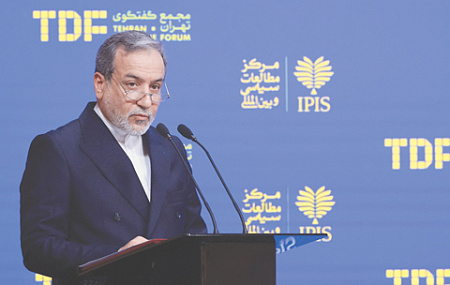
A full-scale deal between the United States and Iran is technically impossible before the end of the summer, U.S. officials said following the fifth round of U.S.-Iranian consultations in Rome. Washington and Tehran are currently working on a framework agreement that will be an interim step. It may include a clause on the introduction of strict inspections at Iranian nuclear facilities and a commitment by the United States to ease sanctions pressure on the Islamic Republic. The main knot of controversy is related to the question of whether Iran will be able to maintain its uranium enrichment program.
American officials said in a conversation with NBC that it was technically impossible to reach a specific deal between Iran and the United States before the summer.
According to them, the main problem is the technical complexity of the potential agreement and the remaining contradictions. In this regard, the parties are currently developing a framework agreement, which will become an interim phase, according to sources from The Wall Street Journal. Tehran wants to include in the text a confirmation of its right to a peaceful nuclear program and a commitment to renounce the creation of nuclear weapons. In addition, the agreement may involve the introduction of strict international inspections at Iran’s nuclear facilities and the easing of some US sanctions.
It all comes down to the question of whether Tehran will be able to maintain the right to enrich uranium at the minimum levels necessary for its civilian program. Washington demands that the Islamic Republic completely abandon enrichment, but it opposes it. Iran’s Supreme leader Ali Khamenei, who controls the mechanism for making government decisions, called the demands to stop processing uranium as “excessive and outrageous,” pointing out that negotiations on such terms would not lead to any results. In a conversation with NBC, a senior Iranian source remarked: “If Washington abandons its demand for zero enrichment, then a political agreement is quite feasible.”
Following the results of the fifth round of Iranian-American consultations held in Rome, Iranian Foreign Minister Abbas Araghchi informed that the parties had agreed to “finalize their positions” and then organize and hold the next round of negotiations. “I hope that during the next one or two meetings we will be able to reach solutions that will allow the negotiations to move forward,” the minister admitted. “Thanks to Oman’s work to remove obstacles, there is a chance of progress.” Araghchi called the fifth round of negotiations one of the most professional at the moment. “We have outlined Iran’s position. I think the American side has become much more aware of Iran’s position,” he said.
A senior American official, quoted by the Israeli newspaper Israel Hayom, said that the talks in Italy lasted more than two hours and took place both directly and indirectly with the participation of Omani diplomats. “The negotiations continue to be constructive: we have made further progress, but there is still much to be done,– explained the interlocutor of Israel Hayom. – Both sides have agreed to meet again in the near future. We are grateful to our Omani partners for their continued support.”
However, the date and venue of the next round of negotiations have not yet been precisely announced.
Meanwhile, Iranian politicians are expressing pessimism about the outcome of the consultations. “We have no hope yet, because the American side still insists on the principle of “zero enrichment,” and I know that the Islamic Republic of Iran will never agree to “zero enrichment,” said Ebrahim Rezaei, a representative of the Committee on Foreign Policy and National Security of the Majlis (Parliament) of Iran, commenting on the The second round of consultations. – I am disappointed and do not have high hopes that the negotiations will lead to a deal. We are preparing for plan B.
However, Rezai did not explain what this alternative option implies. As previously reported by sources of the Reuters news agency, Tehran does not have a plan “B” in case of a breakdown in negotiations. The conclusion of the dialogue without any result will lead to the start of an Israeli operation to dismantle Iran’s nuclear facilities. In recent weeks, the army of the Jewish state has begun working on a bombing scenario, which, according to Israeli officials, could last at least a week in the event of a breakdown in the negotiation process. The question now remains whether Israel is ready to circumvent the administration of US President Donald Trump.
Against this background, Tehran is proposing to deepen the nuclear infrastructure. “Iran is ready to store its enriched uranium reserves thousands of meters underground, no matter what we are told,” General Hossein Daghighi, chief adviser to the leader of the elite Islamic Revolutionary Guard Corps, said recently. – We said that we do not possess nuclear weapons, but now they (representatives of the international community. – “NG”) they say that we should not even engage in enrichment. We do not accept this.”
